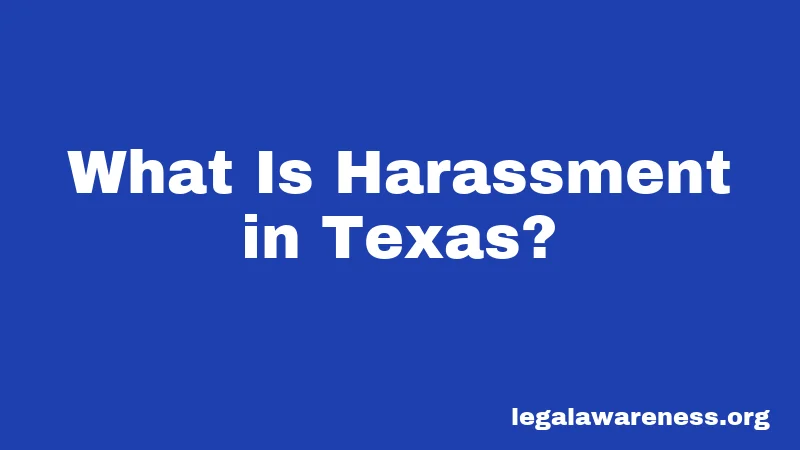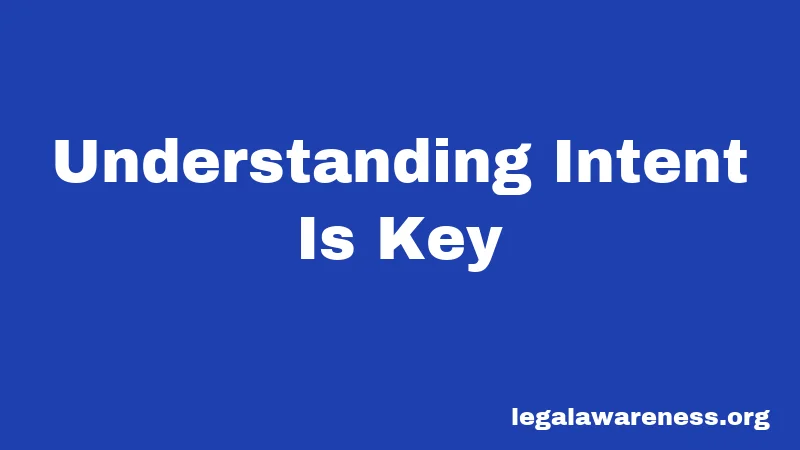Texas Harassment Laws in 2026: Stay Out of Legal Trouble
Most people think harassment is no big deal. It’s not. In Texas, harassment laws are serious. The penalties can hit hard—jail time, heavy fines, and a criminal record that sticks around.
Here’s what you really need to know. We’ll break down exactly what’s illegal. We’ll explain the penalties. And we’ll show you how to stay on the right side of the law.
What Is Harassment in Texas?

Okay… this one’s important. Harassment in Texas is any behavior intended to harass, annoy, alarm, abuse, torment, or embarrass another person. Notice that word: “intended.” You have to mean it.
Think of it like this. It’s not just about being rude. It’s about deliberately trying to mess with someone’s peace of mind. Texas law takes this seriously. The state tracks dozens of types of harassment behaviors.
The Ten Ways You Can Break Texas Harassment Laws
Trust me on this. There are a lot of ways to commit harassment. Here are the main ones you should absolutely know about.
Making Obscene Communications
Making inappropriate sexual comments during a conversation is harassment. This applies even if it’s a first contact. You can’t send obscene messages or make obscene suggestions.
Not sure what counts as obscene? The law defines it pretty clearly. It means sexually explicit descriptions or suggestions related to sexual acts. Texas takes this seriously.
Making Threats About Harm
Threatening to hurt someone is illegal. This includes threats to hurt them, their family members, or their property. The threat needs to be serious enough that it would alarm a reasonable person.
Here’s where it gets tricky. Even joking threats can count. A judge or jury might believe you meant it. The law doesn’t care if you were “just kidding around.”
Spreading False Reports About Someone’s Death
You cannot tell people that someone else has died or suffered serious injury. Making up false reports to alarm others is a crime. You must know the report is false when you spread it.
This one surprises people. But the damage to the victim is real. That’s why Texas made it illegal.
Making Repeated Prank Calls
Making someone’s phone ring repeatedly counts as harassment. Calling anonymously to harass them is illegal. Even failing to hang up after you’ve called is a crime.
Wondering if this applies to you? If you’re calling the same number multiple times to annoy someone, you’re breaking the law.
Making Repeated Electronic Communications
Sending repeated text messages or emails to annoy someone is harassment. Sending multiple messages to bother, alarm, or embarrass them is criminal. This includes emails, instant messages, social media messages, and any form of electronic communication.
Here’s what you need to do: Stop. Don’t send that tenth message. The law requires a pattern of behavior. Multiple messages pointing toward harassment? That’s criminal.
Posting Harassment Online
Publishing repeated hostile messages on social media is illegal. Posting things on websites or social platforms meant to cause emotional distress counts. There’s one exception: if your speech relates to a matter of public concern.
Honestly, this is the part most people get wrong. They think social media gives them a free pass. It doesn’t. Courts take online harassment seriously.
Tracking or Monitoring Someone
Tracking someone’s movements without permission is harassment. Using tracking apps on their phone or car without consent is illegal. Physically following someone to harass them also counts.
Sound complicated? It’s actually straightforward. Don’t track people. Don’t use apps to monitor them. Don’t follow them around. Pretty simple.
Using Temporary Phone Numbers to Harass
As of September 1, 2025, using temporary or disposable phone numbers to harass someone is illegal. Using these numbers to hide your identity while communicating threats or repeated harassment is a crime. Texas lawmakers added this in the 2025 law changes.
This one’s relatively new. Many people don’t realize it’s illegal yet. The law covers using apps that generate temporary phone numbers for harassment purposes.
Targeting Utility Workers
Here’s where it gets interesting. If you harass utility employees, contractors, or agents performing their jobs, harsher penalties apply. These enhanced penalties took effect September 1, 2025.
A worker comes to your house to read a meter. You cannot harass them while they work. The penalties are stronger for this type of harassment.
Understanding Intent Is Key

Here’s something critical. The prosecution must prove intent. They have to show you meant to harass, annoy, or embarrass someone. Accidentally annoying someone doesn’t count.
But here’s the catch: intent can be shown through your behavior patterns. Sending messages repeatedly? That shows intent. Continuing after someone asks you to stop? That’s intent too.
Texas Harassment Penalties: What Actually Happens
Let’s talk about what you’ll face if convicted. Most harassment charges are Class B misdemeanors.
Class B Misdemeanor (Most Common)
You could face up to 180 days in county jail. You could be fined up to $2,000. You might get both jail time and fines. This is for a first offense.
That’s six months in jail. That’s serious. Most jobs won’t hold your position that long. A criminal record follows you forever.
Class A Misdemeanor (If You Have Prior Convictions)
If you’ve been convicted of harassment before, this is what happens. You face up to one year in county jail. The fine goes up to $4,000. Both penalties can apply.
That’s double the jail time. That’s double the fine. Prior convictions make everything worse.
Enhanced Penalties for Recent Changes (2025)
Remember those utility workers? If you harass someone performing utility work, you face Class A misdemeanor penalties. These enhanced penalties apply even for first-time offenses.
So you face up to $4,000 in fines. You face up to one year in jail. This applies to utility employees, contractors, and their agents.
Stalking Escalation
Here’s where things get really serious. If your harassment is part of a pattern of stalking, you can be charged under Texas Penal Code 42.072. This becomes a felony.
A felony conviction is different. You’re looking at two to ten years in prison. You could face up to $10,000 in fines. Your life changes permanently.
Additional Consequences Beyond Criminal Penalties
Okay, pause. Read this carefully. A conviction affects more than just your criminal record.
You might get probation. That means monthly meetings with a probation officer. You’ll pay probation fees. You might have to attend classes. You could face community service. You might get a restraining order.
Your job could be at risk. Employers check criminal records. Many jobs won’t hire people with harassment convictions. Professional licenses can be suspended or revoked. College admissions get harder.
Special Situations and Recent Changes

The 2025 Law Changes
The Texas legislature made updates in 2025. These changes clarify and strengthen harassment laws. Understanding them is important.
The first major change: they fixed numbering issues. Tracking and temporary phone number communications now have clear definitions. The second change: utility worker harassment got harsher penalties.
These 2025 changes are effective September 1, 2025. Any conduct after that date uses the new law. Conduct before that date uses the old law.
Defending Against Harassment Charges
You’re not alone if you’ve been accused. This happens more often than you think. Common defenses include showing you didn’t intend to harass.
For example: A parent texts an ex repeatedly about picking up kids. That’s not harassment. The communication has a legitimate purpose. Intent matters.
Difference Between Harassment and Stalking
Confused about the difference? Let me break it down. Harassment is repeated conduct meant to annoy or alarm someone. Stalking involves patterns of conduct that make someone fear for their safety.
Stalking is more serious. It becomes a felony. A harassment charge can become stalking if the victim fears serious harm.
When Harassment Involves Minors
If the victim is under 18 and you’re an adult, penalties increase. Courts take crimes against minors seriously. The charges can escalate.
Most people don’t realize how strict these laws are. A seemingly minor incident can result in major consequences.
How to Report Harassment in Texas
Think someone is harassing you? Here’s what you need to do.
Document everything. Save all messages. Take screenshots. Write down dates and times of incidents. Keep a written record of what happened. This evidence is crucial for police.
Contact local police. File a formal report. Give them all your documentation. They’ll investigate the complaint. They’ll decide whether to pursue charges.
You can also get a protective order. This is a court order preventing contact. The person faces jail time if they violate it. It’s a serious legal tool that actually works.
Consider an attorney. Even before charges are filed, a lawyer can advise you. They can protect your rights. They can help navigate the process.
What You Should Do to Stay Safe from Harassment Charges
Here’s practical guidance. Follow these steps and you’ll avoid problems.
Don’t repeatedly contact someone who doesn’t want contact. One message is fine. Two is borderline. More than three? You’re in trouble. After someone says stop, actually stop. That’s the key.
Never make threats about harm. Don’t even joke about it. Never spread false reports about people. Don’t track anyone without clear permission. Don’t use apps to monitor partners or exes unless you have explicit agreement.
Don’t post hostile messages on social media about specific people. Don’t harass people at their workplace. Don’t use fake phone numbers to hide harassment.
When in doubt, ask yourself this: Would a reasonable person feel alarmed or tormented by this behavior? If the answer is yes, don’t do it.
Frequently Asked Questions
Can a single text message constitute harassment? No, not usually. The law requires repeated communications. One message won’t result in charges. A pattern of messages does.
What if I was joking when I made a threat? Intent matters, but jokes about harm are dangerous. A jury might not believe you were joking. The victim’s reaction matters too. Don’t joke about threats.
Do I need a restraining order before filing harassment charges? No, you don’t need a restraining order first. You can file criminal charges directly with police. A protective order can happen separately.
If someone harasses me online, can I report them to police? Yes, absolutely. Police investigate online harassment. You need to document everything. Screenshots and dates are essential.
What happens if I violate a protective order related to harassment? Violating a protective order is separate crime. It can be a Class A misdemeanor or higher. You face additional jail time and fines on top of original charges.
Is cyberbullying treated differently from in-person harassment? No, the law treats them the same. Whether it’s online or in person, harassment is harassment. Electronic communications are specifically covered under the law.
Can I get the charges dropped if we reconcile? Not automatically. Once charges are filed, the state prosecutes. Victims don’t have the final say. Prosecutors decide whether to continue.
What’s the difference between civil and criminal harassment charges? Criminal harassment is a crime. You face jail and fines. Civil harassment is a lawsuit. It results in a restraining order and damages. Both can happen at the same time.
Final Thoughts
Now you understand Texas harassment laws. Stay informed. Stay safe. When in doubt, ask a lawyer.
The rules are clear. Don’t harass people. Don’t make threats. Don’t track or monitor others without permission. Don’t spread false reports. Keep your communication respectful.
If someone is harassing you, report it to police. Document everything. Get a protective order if needed. Don’t try to handle it alone.
And remember: these laws exist to protect people. Harassment causes real harm. Texas takes it seriously. You should too.
